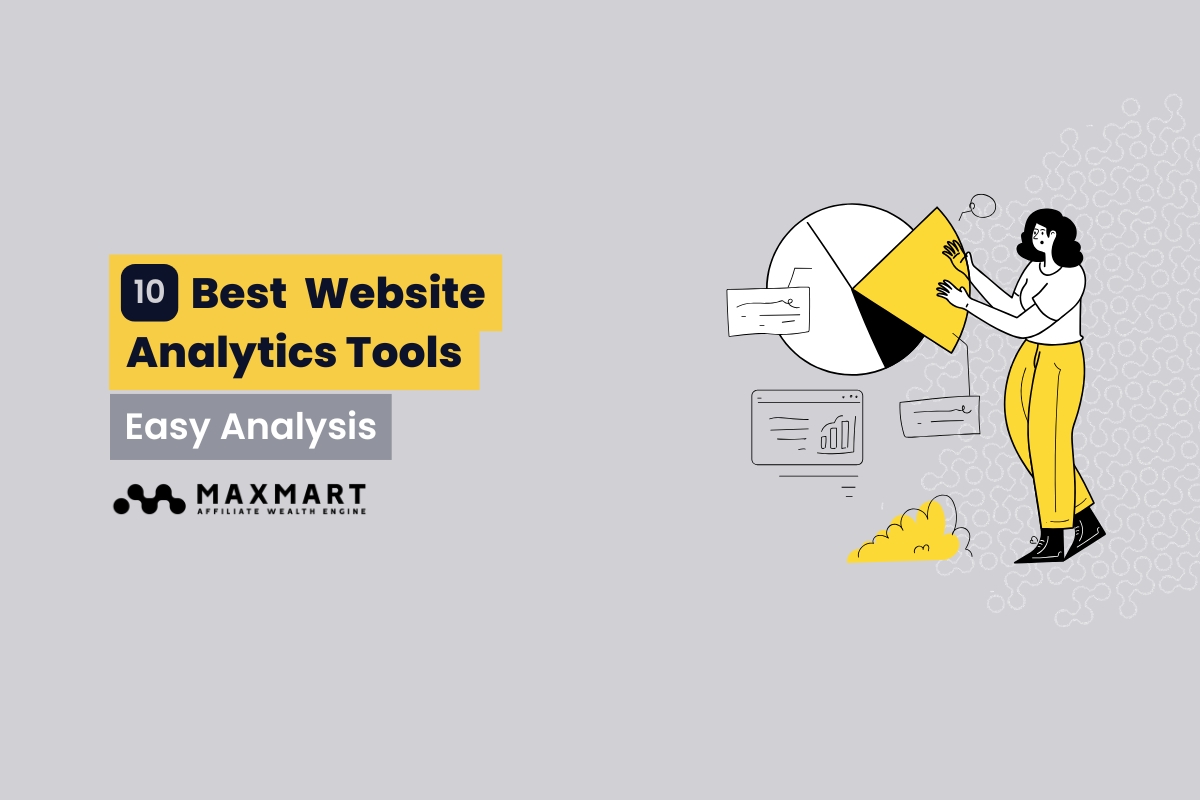Have you ever wondered how websites track visitors, understand user behavior, or optimize content effectively? The right website analytics tools are essential for any business aiming to enhance online engagement and drive growth.
Let’s explore some potentially unexplored pain points of your website’s performance with the help of the top website analytics tools in 2024, showcasing how they can transform your digital strategy. No matter if you’re a small business owner, a marketing professional, or just curious about the data behind websites, read on to discover which tools can help you achieve your online goals.
What Are Website Analytics Tools and What Do They Do?
Website analytics tools are sophisticated software solutions designed to measure and evaluate the activity on your website. Here’s what these tools can do for you:
- Visitor Tracking: They identify where your visitors come from, which devices they use, and how they navigate through your site.
- Behavior Analysis: These tools analyze user interactions on your site, including page views, clicks, and time spent on each page.
- Conversion Tracking: They help monitor how well your site converts visitors into customers or leads, tracking actions like sign-ups, purchases, and downloads.
- Content Optimization: By understanding which content performs best, you can tailor your website to better meet the needs of your audience.
Using website analytics tools, businesses can gain valuable insights into user behavior, enhance site effectiveness, and drive more targeted traffic, ultimately boosting overall performance and engagement.
Don’t have a website to analyze yet? Build your own using some of the best website builders of 2024!
Website Analytics vs SEO Analytics Explained
Mistaking website analytics and SEO analytics is a common mishap. So before we get to the actual list, it is worthwhile to explore both concepts and how they differ to gain clarity on what we are learning about. Here’s a brief overview before we delve into the specifics:
- Website Analytics:
- Definition: These tools focus on measuring and understanding the overall activity within your website.
- User Interaction: Tracks how users interact with your site, including their navigation paths and on-site behaviors.
- Performance Metrics: Measures key performance indicators like page load times, bounce rates, and responsiveness.
- Conversion Data: Provides insights on how effectively your site converts visits into actionable outcomes like sales or sign-ups.
- SEO Analytics:
- Definition: These tools are specialized in evaluating your website’s search engine presence and effectiveness.
- Visibility and Ranking: Focuses on how well your pages are ranked in search engine results and the visibility of your website.
- Website Traffic Analysis: Analyzes which keywords drive traffic to your site, helping you refine your content and SEO strategies.
- Backlink Analysis: Tracks the quality and quantity of backlinks, essential for improving your site’s authority and search rankings.
While website analytics gives you a broad view of your site’s overall health and user engagement, SEO analytics is more specialized, concentrating on your site’s visibility and performance in search engines. MaxMart has also covered SEO competitor analysis tools!
10 Essential Website Analytics Tools for 2024
With a clearer understanding of what website analytics and SEO analytics tools can offer, let’s explore some of the top website analytics tools available in 2024. These tools can provide the insights needed to elevate your website’s performance.
You can also learn more about establishing a proper website and optimizing it using our other product reviews at our website tools learning section!
1. Google Analytics 4 (GA4)

Google Analytics 4 (GA4) is the latest iteration of Google’s powerful web analytics tool, designed to provide deeper insights into user interactions across websites and apps. Unlike its predecessor, GA4 uses an event-based data model that allows for more comprehensive and granular tracking of user activities.
This model facilitates a more integrated view of how users interact with online content, making it an essential tool for businesses aiming to understand and enhance user experiences.
Pros:
- Integrated Cross-Platform Tracking: GA4 excels in its ability to track users across devices and platforms, providing a unified view of the customer journey.
- Advanced Machine Learning: Utilizes Google’s machine learning capabilities to automatically highlight important data trends and user behaviors, helping predict future actions like churn probability and potential revenue.
- Flexible Event Tracking: Users can customize which interactions to track without the need for additional coding, making it adaptable to specific business needs.
Cons:
- Steep Learning Curve: The shift from a session-based model to an event-based model can be complex for users accustomed to previous versions of Google Analytics.
- Limited Historical Data: GA4 does not migrate historical data from earlier versions, which means businesses start with a clean slate of data collection.
- Dependency on Google Ecosystem: While integration with Google products is robust, it may limit functionality with non-Google tools.
Verdict: Google Analytics 4 is a powerful website analytics tool that offers advanced, integrated insights for modern businesses. Its use of machine learning and flexible event tracking makes it a forward-thinking choice for those willing to adapt to its new data model.
The tool is particularly valuable for businesses heavily invested in the Google ecosystem and looking for deep cross-platform user insights.
Pricing:
- Free Version: Offers core analytics features suitable for most small to medium-sized businesses.
- Google Analytics 360: A premium version with additional features and higher data limits. Pricing is custom and typically starts around $150,000 per year, aimed at large enterprises requiring extensive analytics.
2. Adobe Analytics
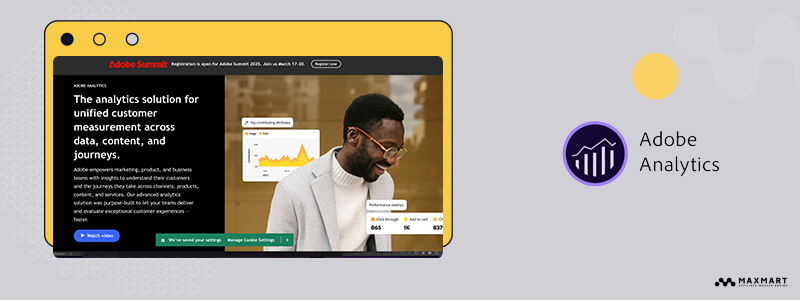
Adobe Analytics is a segment of the Adobe Experience Cloud that offers advanced analytics capabilities tailored for enterprises seeking deep insights into their customer interactions across multiple channels.
This website analytics tool is known for its powerful segmentation, real-time analytics, and comprehensive integration capabilities, which make it a favorite among large businesses with complex data needs.
Pros:
- Rich Data Integration: Adobe Analytics can integrate data from various sources, including offline and online channels, providing a holistic view of the customer journey.
- Customizable Dashboards and Reports: Offers highly customizable options for visualizing data and creating reports, tailored to specific business requirements.
- Predictive Analytics: Features advanced predictive capabilities using AI and machine learning to forecast future trends and customer behaviors.
Cons:
- Complexity and Cost: It is generally more complex and significantly more expensive than many other website analytics tools, making it less accessible for smaller businesses.
- Resource-Intensive: To fully leverage the platform, businesses often need dedicated analysts or trained personnel, adding to operational costs.
- Implementation Time: Setting up Adobe Analytics can be time-consuming, requiring substantial customization to fit specific business needs.
Verdict: Adobe Analytics is an exceptionally powerful website analytics tool best suited for large enterprises that require detailed and comprehensive insights into their extensive data sets.
Its ability to handle massive volumes of data and provide actionable insights through advanced analytics and AI makes it a top-tier choice for businesses that can afford its complexity and cost.
Pricing:
- Adobe does not publicly disclose exact pricing for Adobe Analytics, as it is typically customized based on the specific needs of the business. Prospective users must contact Adobe directly for a quote.
- Plans often include:
- Base Plan: Custom pricing tailored to enterprise needs.
- Premium Plan: Includes additional features and support options, also custom-priced.
3. Matomo
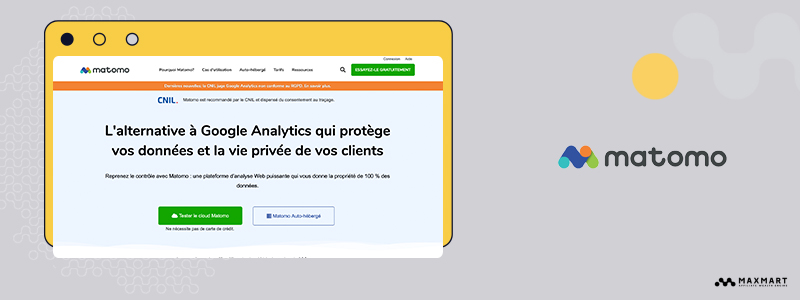
Matomo, formerly known as Piwik, is one of the most comprehensive open-source web analytics tools that offers a privacy-focused alternative to mainstream analytics platforms like Google Analytics. It allows businesses to have full ownership and control of their analytics data, with strong emphasis on user privacy and data protection.
This tool is particularly popular among businesses and organizations looking for a customizable and self-hosted analytics solution.
Pros:
- Privacy and Data Ownership: As a self-hosted platform, Matomo ensures that all collected data remains exclusively in the user’s hands, complying with strict privacy laws like GDPR.
- Customizable and Extensible: Users can customize and extend the functionalities through plugins and add-ons, tailored to specific needs.
- Comprehensive Feature Set: Despite being open-source, it offers features comparable to those of major proprietary tools, including real-time data updates, detailed visitor logs, and e-commerce tracking.
Cons:
- Self-Hosting Requirements: Requires server resources and technical know-how to set up and maintain, which may be a barrier for smaller or less tech-savvy businesses.
- User Interface: While functional, the UI can be less intuitive and visually appealing compared to more modern solutions.
- Performance Issues: Handling large volumes of data may require additional server optimization and can affect performance.
Verdict: Matomo is an excellent website analytics tool for those prioritizing data privacy and ownership. It is ideal for companies capable of managing a self-hosted platform and looking for a powerful, customizable analytics solution without the reliance on third-party providers.
Matomo’s commitment to privacy and extensive features make it a commendable choice for privacy-conscious organizations.
Pricing:
- Free Version: The basic self-hosted version is free to use.
- Cloud Version: Hosted by Matomo, eliminating the need for self-hosting.
- Essential Plan: Starting at $23 per month for up to 50,000 monthly visits.
- Business Plan: Starting at $39 per month for up to 150,000 monthly visits.
- Enterprise Plan: Custom pricing for higher requirements.
4. Mixpanel
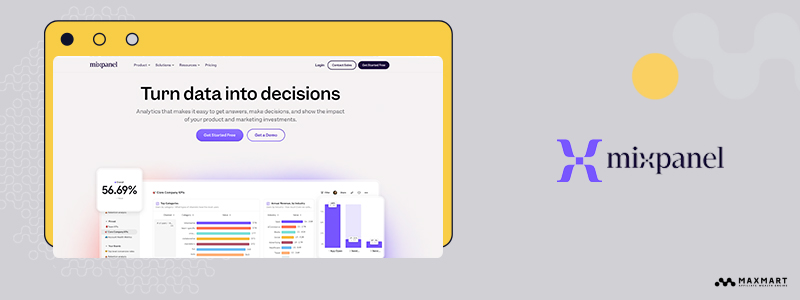
Mixpanel stands out as one of the most sophisticated site analytics tools designed for tracking user interactions and analyzing mobile and web applications with a focus on event and user-based analytics. This tool is renowned for its detailed user tracking capabilities, providing insights into user behavior through funnels, cohorts, and retention analyses.
Mixpanel enables businesses to make data-driven decisions based on user actions, rather than mere page views, offering a deep dive into how users interact with applications.
Pros:
- Event-Centric Approach: Focuses on user actions to provide detailed insights, allowing businesses to track every interaction within their applications.
- Powerful Segmentation and A/B Testing: Offers robust tools for segmenting users and conducting A/B tests to optimize user experiences.
- Automated Insights: Leverages machine learning to automatically detect and report on significant changes and trends in user behavior.
Cons:
- Pricing for High-Volume Users: Can become quite expensive for businesses as data points increase, especially at scale.
- Complex Setup: May require a steep learning curve and significant setup time to fully utilize its advanced features.
- Data Overload: The depth of data available can be overwhelming for users without a clear analytics strategy or specific questions in mind.
Verdict: Mixpanel is an exceptional website analytics tool for businesses that are focused on understanding deep user behavior and optimizing their products accordingly.
Its user-centric analytics provide actionable insights that are crucial for businesses looking to refine their user experiences and increase engagement. However, its advanced capabilities come with a cost and complexity that may not suit all businesses.
Pricing:
- Free Plan: Limited to tracking 100K monthly tracked users.
- Growth Plan: Starts at $25 per month, scales with the number of tracked users.
- Enterprise Plan: Custom pricing with advanced features and support for businesses with large-scale analytics needs.
5. Amplitude
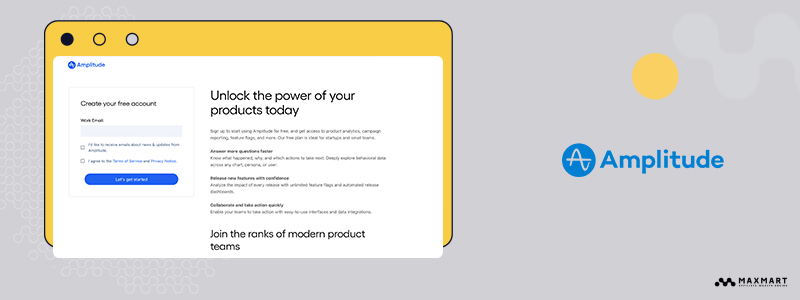
Amplitude is a robust website analytics tool designed to analyze user behavior across websites and mobile apps comprehensively. It excels in providing real-time analytics and user segmentation, helping businesses understand the complete user journey and optimize their digital products accordingly.
Amplitude is particularly valued for its intuitive interface and the depth of insights it offers into user engagement and product effectiveness.
Pros:
- User Journey Tracking: Amplitude excels at visualizing the user journey, offering detailed pathways that help identify critical touchpoints and drop-offs.
- Real-time Analytics: Provides up-to-the-minute data, allowing businesses to make quick decisions based on current user behaviors.
- Integration and Collaboration: Seamlessly integrates with other tools and platforms, enhancing collaborative efforts across teams with shared dashboards and reports.
Cons:
- Complexity for Beginners: The depth and breadth of features can be overwhelming for new users or smaller teams without dedicated data analysts.
- Cost at Scale: As businesses grow and their data needs increase, Amplitude’s pricing can become a significant expense.
- Customization Requirements: To get the most out of Amplitude, significant customization is often required, necessitating a higher investment in time and resources.
Verdict: Amplitude is another one of powerful monitoring websites for businesses focused on detailed behavioral analytics and real-time data usage. It is especially suitable for medium to large enterprises that require an in-depth understanding of user interactions to drive product decisions and improvements.
While it offers substantial benefits in user journey analytics, the cost and complexity may be considerations for smaller or less tech-savvy businesses.
Pricing:
- Free Plan: Offers core analytics features for startups and small teams.
- Growth Plan: Custom pricing based on the usage and features needed; typically suitable for growing businesses.
- Enterprise Plan: Tailored for large businesses with advanced needs; includes premium support and training.
6. Hotjar
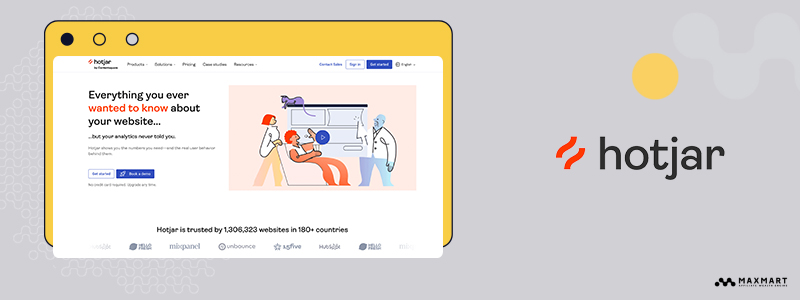
Hotjar is a unique website analytics tool that complements traditional analytics platforms by focusing on qualitative data like heatmaps, session recordings, and user feedback surveys. This tool is designed to provide a deeper understanding of the user experience on a website, capturing how visitors interact with the site beyond just clicks and page views.
Hotjar’s visual and feedback-oriented approach makes it particularly valuable for optimizing website design and improving user engagement.
Pros:
- Visual Insights: Hotjar excels at providing intuitive visual representations of user behavior through heatmaps and session replays, which show exactly how users interact with your website.
- User Feedback Tools: Integrates direct user feedback tools such as polls and surveys, allowing businesses to gather actionable insights directly from their users.
- Ease of Use: Designed with user-friendliness in mind, Hotjar can be quickly set up and used by teams without in-depth technical expertise.
Cons:
- Data Privacy Concerns: The nature of session recordings and heatmaps may raise data privacy issues, requiring strict adherence to privacy laws and user consent.
- Limited Quantitative Data: While excellent for qualitative insights, Hotjar does not offer the extensive quantitative analytics found in tools like Google Analytics or Adobe Analytics.
- Scalability: May not be as scalable in handling extremely large volumes of traffic as some purely quantitative website analytics tools.
Verdict: Hotjar is an excellent addition to a suite of analytic tools for websites, particularly for businesses focused on improving user experience and website usability. Its strengths in visual data presentation and user feedback collection make it invaluable for website designers, marketers, and user experience professionals looking to make data-driven improvements.
However, for deep quantitative analysis or large-scale data needs, it is often used in conjunction with other analytics tools.
Pricing:
- Basic Plan: Free, with limited reports and data storage.
- Plus Plan: Starting at $39 per month, suitable for low to mid-range traffic sites.
- Business Plan: Starting at $99 per month, designed for higher traffic sites with more extensive needs.
- Scale Plan: Custom pricing for very high traffic or large business needs.
7. Piwik PRO

Piwik PRO is an advanced website analytics tool that provides comprehensive tracking capabilities with a strong focus on user privacy and data security. It is designed for businesses and organizations that need to comply with stringent data protection regulations such as GDPR, HIPAA, or CCPA. Piwik PRO offers both cloud and on-premises hosting options, giving users complete control over their data.
If hosting is a topic for you, you can outsource it to some of the best web hosting services of 2024, as reviewed by MaxMart.
Pros:
- Privacy and Compliance: Piwik PRO is built with privacy at its core, offering full data ownership and ensuring compliance with global data protection laws.
- Flexible Deployment Options: Users can choose between cloud or on-premises hosting, allowing for greater control over data security and infrastructure.
- Comprehensive Analytics Suite: Includes features like event tracking, custom dimensions, and detailed user journey mapping, all accessible through a user-friendly interface.
Cons:
- Complexity in Setup and Maintenance: The on-premises version requires technical expertise to deploy and maintain, which might be challenging for smaller teams without IT support.
- Cost Considerations: While it offers a robust set of features, the total cost of ownership, especially for the on-premises deployment, can be high compared to fully hosted solutions.
- Limited Third-Party Integrations: While comprehensive, Piwik PRO may not integrate as seamlessly with other marketing tools as some of its competitors.
Verdict: Piwik PRO is an excellent website analytics tool for organizations that prioritize data privacy and need to adhere to strict compliance standards. Its robust analytics capabilities and flexible deployment options make it a versatile choice for businesses looking for deep insights without compromising on user data security.
However, the tool’s complexity and cost may make it less suitable for smaller businesses or those without dedicated IT resources.
Piwik focuses on security, but if you are looking for dedicated security measures, you can find them in our list of the best website security checkers of 2024!
Pricing:
- Standard Plan: Offers basic analytics features; pricing starts at a base rate with additional costs for increased data capacity and features.
- Professional Plan: Enhanced features and support, priced according to data usage and specific customer needs.
- Enterprise Plan: Tailored solutions with full feature access and premium support; custom pricing based on the scope of deployment and support requirements.
8. Woopra
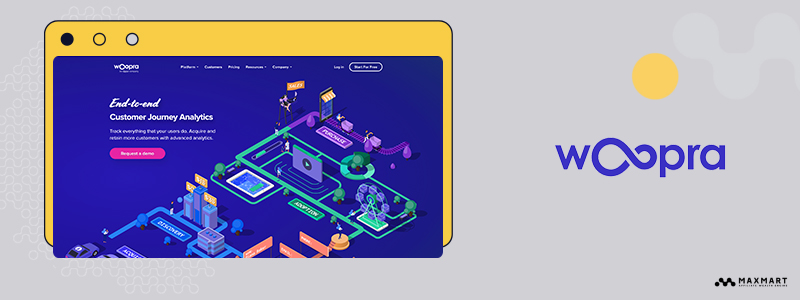
Woopra is a website analytics tool designed to track and analyze the end-to-end customer journey across multiple touchpoints and channels. Its real-time data tracking and user-centric analytics approach allow businesses to understand customer behaviors and optimize their interactions effectively.
Woopra is especially suited for companies looking to integrate customer data from various sources to create a cohesive view of customer activities.
Pros:
- Real-Time Analytics: Woopra offers live data updates, allowing businesses to react promptly to customer actions as they occur.
- Customer Journey Tracking: Provides detailed insights into the customer journey, mapping out each touchpoint to understand and enhance the overall customer experience.
- Integration Capabilities: Easily integrates with a wide array of third-party tools and services, enhancing data collection and enabling comprehensive analytics across different platforms.
Cons:
- Learning Curve: The depth and breadth of features can be overwhelming for beginners or smaller teams without dedicated analytics support.
- Pricing at Scale: Costs can escalate as demands for data volume and integration grow, potentially making it less accessible for smaller businesses.
- Customization Complexity: While highly customizable, setting up and maintaining custom configurations can require substantial technical expertise.
Verdict: Woopra is a powerful website analytics tool that excels in real-time tracking and analyzing detailed customer journeys. It is an excellent choice for businesses that require an in-depth, integrated view of their customer interactions across multiple platforms.
While the tool provides valuable insights that can significantly enhance customer engagement strategies, the cost and complexity may be considerations for smaller organizations.
Pricing:
- Startup Plan: Free, with basic features for small businesses with limited tracking needs.
- Pro Plan: Starting at $999 per month, offering full analytics capabilities suitable for medium-sized businesses.
- Enterprise Plan: Custom pricing based on the specific needs and scale of the business, designed for large enterprises requiring extensive tracking and integration.
9. Heap
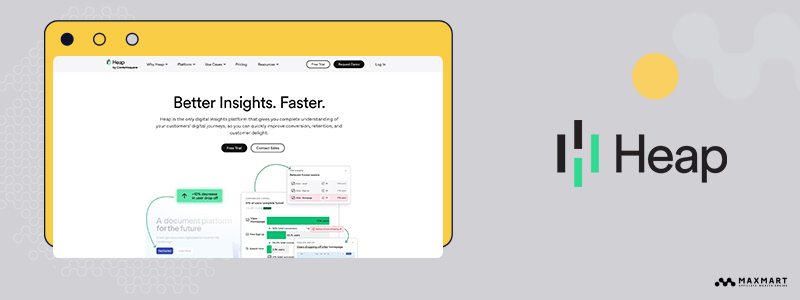
Heap is a dynamic website analytics tool that automatically captures all user interactions on a website or mobile app, including clicks, taps, swipes, and form submissions, without the need for manual tracking code setup.
This feature-rich platform is particularly suited for product teams and marketers who want to gather comprehensive data without prior analytics planning, enabling them to analyze user behavior retroactively.
Pros:
- Automatic Data Capture: Heap captures every user interaction automatically, removing the need for predefined events or tracking setup, which simplifies data collection.
- Retroactive Analytics: Allows users to define events and analyze data retroactively, making it easier to adapt analysis and insights as business needs evolve.
- User-friendly Interface: Provides an intuitive dashboard and visualization tools that make it accessible for non-technical users to derive insights from complex data sets.
Cons:
- Overwhelming Data Volume: The comprehensive data capture can lead to large volumes of data, which can be overwhelming and difficult to manage without clear objectives.
- Higher Cost for High Traffic: Pricing can be prohibitive for startups and small businesses, especially those with high user interactions due to its data-intensive approach.
- Limited Customization in Free Version: The free version has restricted customization options, which may not meet all the analytical needs of more advanced users.
Verdict: Heap is one of the mostinnovative web page analytics tools ideal for teams that require in-depth user interaction data without the complexity of traditional analytics setups. Its automatic data capture and retroactive analysis capabilities make it a powerful option for rapidly iterating and improving digital products.
However, its extensive data collection can be a double-edged sword, requiring clear strategies to manage and extract meaningful insights effectively.
Pricing:
- Free Plan: Basic access with limited data history and features.
- Growth Plan: Custom pricing based on the number of sessions, suitable for growing businesses that need more extensive data analysis.
- Pro Plan: Also custom-priced, provides additional features like more data history, advanced analytics, and customer success support for larger enterprises.
10. Crazy Egg
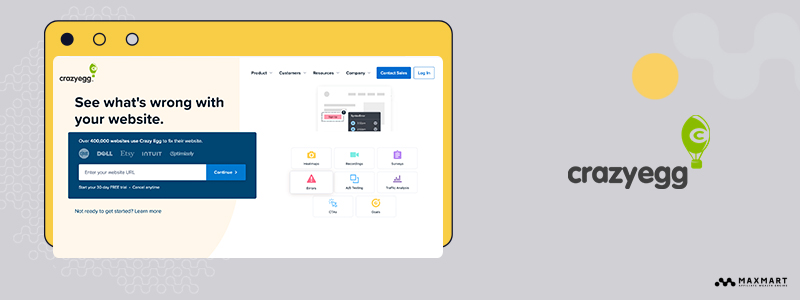
Crazy Egg is a website analytics tool that specializes in providing visual insights into user behavior through heatmaps, scroll maps, and click reports. This tool is designed to help website owners understand how visitors interact with their site elements, which can be invaluable for improving website design, enhancing user experience, and increasing conversion rates.
Crazy Egg’s visual tools make it particularly appealing for marketers, designers, and UX professionals.
Pros:
- Visual Analysis Tools: Crazy Egg excels in delivering detailed visual reports such as heatmaps, scroll maps, and confetti maps that show exactly where users click and how they navigate a website.
- A/B Testing: Includes features for easy A/B testing, allowing users to test different versions of a page to see which performs better in terms of user engagement and conversions.
- Ease of Use: The platform is user-friendly, making it accessible for non-technical users to set up and interpret data effectively.
Cons:
- Limited Depth in Analytics: While excellent for visual insights, Crazy Egg may not offer the depth of analytical data provided by more comprehensive website analytics tools like Google Analytics or Adobe Analytics.
- Data Privacy Concerns: The tracking techniques, especially screen recording, may raise privacy concerns that need to be managed with clear user disclosures and compliance with data protection regulations.
- Focus on Smaller Websites: The features and pricing structure are ideally suited for small to medium-sized websites, which might limit its utility for larger enterprises with more complex needs.
Verdict: Crazy Egg is an effective website analytics tool for businesses focused on optimizing the visual and interactive elements of their websites. Its strength lies in its ability to provide clear, actionable insights through visual data representations, making it a valuable tool for improving user experience and conversion rates.
However, for deeper analytical needs or larger scale applications, it may need to be used in conjunction with other analytics tools.
Pricing:
- Basic Plan: Starting at $24 per month, ideal for small websites with low traffic.
- Standard Plan: Starting at $49 per month, includes more sessions and advanced features.
- Plus Plan: Starting at $99 per month, designed for larger sites needing extensive tracking and A/B testing.
- Pro Plan: Custom pricing for very high traffic sites or businesses that require extensive features and data.
Conclusion
It’ important to optimize your website’s performance, and these website analytics tools are crucial for businesses aiming to do just that. Each tool reviewed offers unique strengths—whether it’s GA4’s integration capabilities, Adobe Analytics’ depth, Matomo’s privacy, Mixpanel’s event tracking, or the visual insights from Crazy Egg. Depending on your business needs—be it detailed behavior analysis, real-time data, privacy concerns, or user engagement visuals—there’s a tool that fits.
MaxMart is dedicated to helping you build a robust online presence. Our commitment extends beyond just analytics; we provide comprehensive resources for establishing your website, employing effective domain tools, and leveraging SEO tools and resources.

